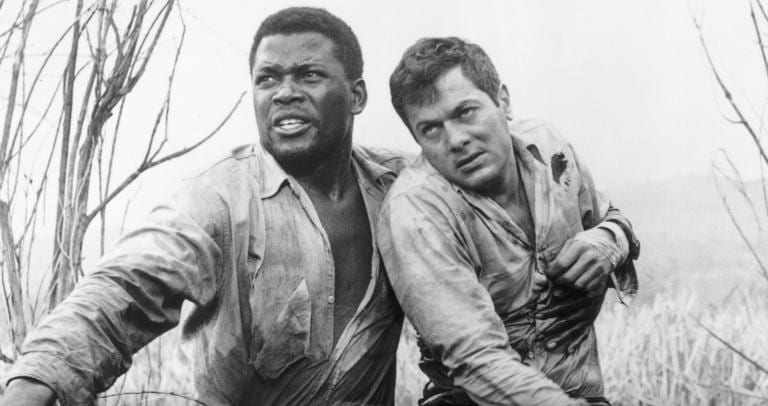Sidney Poitier, one of Hollywood’s most significant actors of the past several decades, has died at the grand age of 94.
The Oscar and BAFTA-winning star’s death was confirmed by Minister of Foreign Affairs Fred Mitchell.
Born in Miami in 1927, Poitier grew up in poverty in the Bahamas before moving to New York aged 16. Having joined the North American Negro Theatre, he managed to find some work on stage before making his film debut as Dr. Luther Brooks in the crime drama No Way Out (1950).
A few years later, he received praise for his turn as rebellious student Gregory W. Miller in the cult hit Blackboard Jungle (1955). He soon landed a number of roles that catapulted him into a category rarely achieved by an African American man of that time, that of leading man.
Having received his first BAFTA nomination for his turn as Tommy Tyler in Edge of the City, Poitier then followed that up with his memorable performance as runaway convict Noah Cullen alongside Tony Curtis in yet another crime-themed film, The Defiant Ones (1958). The Miami native was acknowledged by a number of awards groups as he landed his first Oscar and Golden Globe nominations, plus a BAFTA win for Best Actor.
After playing Porgy in the romantic musical Porgy and Bess (1959), Poitier would enjoy phenomenal success in the 1960s, starting with his gritty turn as Walter Lee Younger in the family drama A Raisin in the Sun (1961).
In 1963, he took on another dramatic role as Homer Smith, a handyman helping a group of German-speaking nuns build a chapel in Lilies of the Field. His performance received unanimous praise as he won a Golden Globe and another BAFTA nod. However, his biggest success came at the Academy Awards, when he became the first African-American man to win the Best Actor Oscar.
In 1965, he appeared in the likes of The Greatest Story Ever Told (1965) and The Bedford Incident (1965) before following them up with another worthy performance as Gordon Ralfe in the romantic drama A Patch of Blue.
1967 would prove to be Poitier’s most lucrative as an actor, as he continued to break ground in three successful films, each dealing with issues of race and race relations.
The first of those was as Mark Thackeray, an idealistic teacher who inspires a group of students (including singer Lulu) to succeed at a rough East London school in the drama To Sir, with Love. Poitier would later return as the character almost thirty years later in a television sequel To Sir, with Love II (1995).
His next role to win him praise was as Dr. John Prentice, an African-American man who is introduced to his white fiancé’s liberal parents (played by Spencer Tracy and Katharine Hepburn) in the race-relations drama Guess Who’s Coming to Dinner.
His final role of that year was perhaps his most memorable, as the no-nonsense Philadelphia detective Virgil Tibbs in the Oscar-winning crime drama In the Heat of the Night.
The film was remembered for two iconic moments involving Tibbs; the first being his iconic line, “They call me MR. Tibbs!” and the second involving his character’s immediate retaliation to being slapped in the face by a racist plantation owner.
Remarkably, Poitier’s three roles were all overlooked by the Academy, which was likely due to vote-splitting. He would later reprise his role as Virgil Tibbs in two sequels; They Call Me Mister Tibbs! (1970) and The Organization (1971).
Following an appearance in For Love of Ivy (1968), the Oscar-winning actor soon turned to directing as he helmed the western Buck and the Preacher (1972). He then he made a number of underwhelming action-comedies starring himself which included Uptown Saturday Night (1974), Let’s Do It Again (1975) and A Piece of the Action (1978).
Having worked on the action-adventure The Wilby Conspiracy (1975), Poitier took a long hiatus from acting between 1977 and 1988. During that period, he directed the hit prison comedy Stir Crazy (1980) which starred Gene Wilder and Richard Pyror. That was followed by recognition by the Golden Globes as he became the recipient of Cecil B. DeMille Award in 1982.
His acting comeback proved a disappointed as he starred alongside tragic young star River Phoenix in the 1988 thriller Little Nikita. However, he received praise for his portrayal of lawyer Thurgood Marshall in the historical series Separate But Equal (1991); a role which landed him Globe and Emmy nominations.
Having portrayed South African president Nelson Mandela in the television film Mandela and de Klerk (1997), Poitier would make his final big-screen appearance as Preston in the thriller The Jackal (1997). He did continue to act in a number of TV-based films, including Free of Eden (alongside his daughter Sydney Tamiia Poitier), David and Lisa (1998) and The Simple Life of Noah Dearborn (1999).
After playing a newly-widowed man in The Last Brickmaker in America (2001), Poitier walked away from acting altogether. The following year, he received an Honorary Oscar for his services to film and would later be a recipient of the BAFTA Fellowship in 2015.
Poitier is survived by his second wife, six daughters, eight grandchildren and three great-grandchildren.



Be the first to comment on "Sidney Poitier obituary: Lilies of the Field and In the Heat of the Night legend dies aged 94"